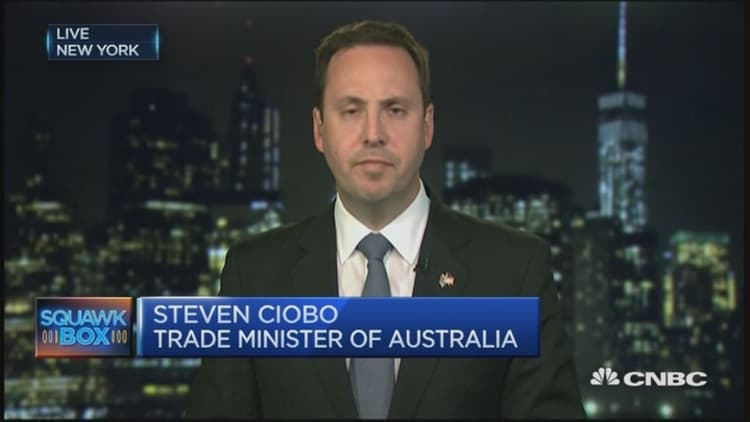Australia's new trade minister has a message to the world: there's more to the country than just commodities.
Steven Ciobo, who recently replaced the former trade and investment minister, Andrew Robb, told CNBC's "Squawk Box" his job right now is to reinforce a couple of key messages.
"One is that Australia is much more than just resources and energy. It's about focusing on the services side of the economy. You know services represent 70 to 80 percent of Australia's economy yet it's only about 20 percent of our exports," he said.
"So there's a lot of scope for us to do more in the services sector and that's where the key part of what I've been focusing on over the past several days I've been in the U.S."
Australia's economic position, in recent times, has come under pressure as a result of the collapse in commodity prices.
The country's seasonally adjusted trade deficit widened in December by 30 percent from the previous month to 3.5 billion Australian dollars ($2.53 billion). On the upside, there was an uptick in the export of services, particularly those related to services.

Ciobo is currently in the United States for the Australia United States Business Week to promote the country as an investment destination to U.S. businesses.
"I know there is a very large appetite for Australia, especially coming from the United States," he said. "The United States is the largest single source country for investment into Australia."
Based on the latest available data from the Australian Bureau of Statistics, the United States invested 758.2 billion Australian dollars ($547.57 billion), or 27 percent of total foreign investment, into the country for the year ended December 31, 2014.
Ciobo added American investors like Australia because of the common language, the country's low sovereign risk profile and the familiarity with its legal and accounting systems.
Ratifying the TPP
Also on Ciobo's agenda is to pursue the ratification of the Trans-Pacific Partnership (TPP) - an ambitious trade deal among 12 Pacific Rim countries including Australia and the United States.
The TPP, which was signed earlier this month in New Zealand, has come under criticism from U.S. presidential hopefuls, including Republican candidate Donald Trump and Democratic candidate Hillary Clinton.
Ciobo said the TPP, which will now undergo a ratification period, is not only in Australia's national interest but it's also in America's interest. "I have had the chance to meet with a number of different people from industry associations [in the U.S.]...[and] I've also met with those that have good contacts into the Congress," he said.
"The take-home message I was left with is that the work continues in relation to TPP ratification...but what is clear is that there is a clear appetite for the TPP to be ratified."
Opportunities in Asia and the Gulf
Aside from the TPP, Ciobo said he is also looking to secure free trade agreements and economic cooperation from emerging economies such as India and Indonesia, as well as the gulf states, Taiwan, and Hong Kong.
"There's also the regional comprehensive economic partnership where there's real opportunity," said Ciobo, referring to a Association of Southeast Asian Nations (ASEAN)-led free trade agreement.
The agreement is still under negotiations and also includes countries that have existing free trade agreements with ASEAN - Australia, China, India, Japan, New Zealand, and South Korea.
Pursuing free trade agreements and economic partnerships in the region and across the globe will work into the Australian government's goals of driving domestic growth and employment.
"We've always had a very open approach, to the benefits that flow from liberalized trade. I intend to continue to pursue liberalized trade very aggressively because it's great for an export nation like Australia," he said.



